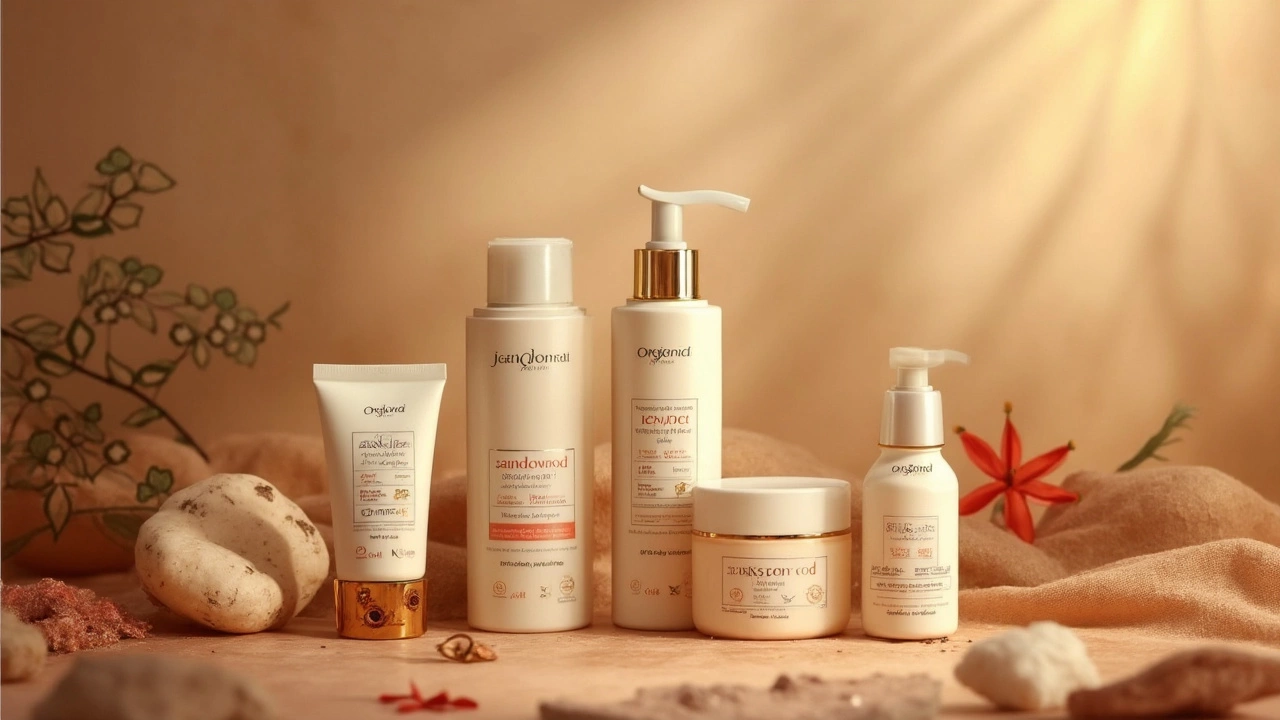
Ever stood before an aisle of skin products, totally confused by what's good for your face? Yeah, been there! Confusing jargon, right? Let's tackle the buzz around organic skincare and figure out if it’s really the Holy Grail for your skin. Organic products have become the hipsters of skincare, but do they live up to the hype?
First up, what exactly makes a product organic? It's all about those natural ingredients growing free of synthetic fertilizers and pesticides. Sounds great, huh? The idea is to keep chemicals off your skin, but organic doesn't automatically mean safer or more effective. It's like comparing natural honey to processed sugar – both sweeten your tea, but one has a bit more going on.
- The Organic Buzz
- Benefits for Your Skin
- Potential Pitfalls
- Key Ingredients to Look For
- Making the Right Choice
The Organic Buzz
So what’s all the hype about with organic skincare? You might have noticed more shelves stocked with products flaunting that ‘organic’ label. But here's the deal – just because it's organic doesn't mean it’s automatically better. It's like the cool kid on the block that everyone wants to know more about.
The main claim for organic products is their natural and chemical-free aspect. They supposedly dodge the synthetic nasties like parabens, sulfates, and phthalates. This thought alone is appealing to folks who want to keep it clean and green. It's no surprise many are jumping on the organic wagon, believing it's a surefire way to protect their skin from harsh chemicals.
Interestingly, a study published in the Journal of the American Academy of Dermatology highlighted that over 50% of consumers believe that organic ingredients are safer than synthetic ones. But, spoiler alert: this isn’t always the case. Some people may still have allergic reactions to natural substances, much like having a peanut allergy while munching on nuts.
You’ll find that many face products labeled as organic include ingredients like aloe vera, chamomile, and green tea – all famed for their soothing properties. It sounds fancy, but it's not rocket science. These ingredients are picked for their potential to calm and nourish sensitive skin. Who doesn’t enjoy a bit of pampering from Mother Nature?
Let's be real, though. Not everything marked as ‘organic’ is 100% pure. Sometimes products contain only a smidge of organic goodness while the rest is, well, not so much. The key is to check certification labels like USDA Organic or certified by ECOCERT. It’s like trying to spot the authentic stuff amongst the fakes on a bargain hunt.
Wrapping this up, the buzz around organic beauty isn't just hype, but it’s essential to arm yourself with knowledge and understand what you're smearing on your face. Awareness is halfway to glowing skin, right? In the end, knowing what works for your skin holds more value than any label ever could.
Benefits for Your Skin
So, you're wondering if organic skincare is worth the hype? Let’s break it down. Many folks love these products because they can be gentler on the skin. Without harsh chemicals, fragrances, or synthetic preservatives, the chance of irritating your skin can drop big time. This can be a game-changer, especially for those who deal with sensitive skin or conditions like eczema.
Some popular organic face products boast antioxidants, vitamins, and minerals straight from nature. Ingredients like aloe vera calm the skin, coconut oil moisturizes, and green tea fights free radicals, which are like the skin's sworn enemies. By keeping free radicals in check, you’re helping reduce signs of aging and keeping your skin looking fresh and youthful.
Another win is the focus on sustainability and eco-friendliness that usually accompanies organic beauty products. Feel good using items that often consider our planet, made with eco-friendly materials and cruelty-free approaches.
But, let's sprinkle in some perspective. Not all skin types will react the same way, and while some people might experience improvements, others might need to tread carefully. Skincare tips here? Always patch-test new products, even if they’re made from unicorn dust!
Ready for some numbers? Consider these elements that make organic products a worthwhile choice:
| Organic Ingredient | Benefit |
|---|---|
| Aloe Vera | Soothes skin irritation |
| Coconut Oil | Superior moisturizer |
| Green Tea | Rich in antioxidants |
These ingredients play crucial roles in a natural regime, offering benefits aligned with more sustainable living. So, whether you're diving in for the good of your skin or Mother Nature, knowing what’s inside those jars can unlock some skincare magic.

Potential Pitfalls
Alright, let's talk about the not-so-glam side of organic skincare. While going natural seems like the best move, it doesn't always come without its bumps. The first bummer? Cost. Organic products often hit your wallet harder. It’s like choosing an organic salad over fast food—it’s better, but you're definitely paying for it.
Another thing to watch out for is the “natural” label. Sometimes, products shout organic beauty, but peek at the back, and you might still spot questionable stuff. It's important to check that actual certification seal to make sure their organic claims aren't just marketing hype.
Also, let’s not forget about shelf life. Without synthetic preservatives, these goodies often have a shorter lifespan. Keep an eye on expiration dates unless you fancy a moldy surprise on your bathroom shelf one day!
And while most of the time they're a dream for sensitive skin, some folks can still have reactions. Not everything from nature jives with everyone, you know? So, if you're trying something new, a patch test is your best friend.
Lastly, not all face products fit your skin type like a glove, organic or not. Always consider your specific skin needs, because even the most natural product might not be the best match.
So, does that mean you should ditch organic products altogether? Not at all, but being aware of these potential pitfalls can save you from skin drama—and some dollars.
| Potential Pitfalls | Impact |
|---|---|
| Cost | Higher price than conventional products |
| Label Confusion | Misleading 'natural' claims |
| Shelf Life | Shorter due to fewer preservatives |
| Skin Reactions | Potential for allergies |
| Suitability | Not all products fit every skin type |
Key Ingredients to Look For
When you're scanning the world of organic skincare for the face, some ingredients pop up more than others. These are the ones that folks in the know rave about.
First on the list? Aloe Vera. This classic plant isn't just a sunburn savior. It's packed with vitamins, enzymes, and acids that can help soothe and hydrate the skin. If you're dealing with dry skin or irritation, products with Aloe Vera might be your new BFF.
Then there's Coconut Oil. You’ve probably heard how great it is for cooking, but it’s also a superstar in the skincare world. Rich in fatty acids, it helps to moisturize and protect your skin's barrier. But heads up if you’ve got oily skin – it might be a tad too heavy.
Looking for a natural exfoliant? Say hello to Oats. Ground oats work gently on the skin to slough off dead cells, while offering anti-inflammatory benefits. Perfect for anyone battling sensitivity or those tiny annoying bumps.
Also, check out Green Tea extract. It’s not just for sipping! Green Tea is brimming with antioxidants, and it's fantastic for reducing inflammation and fighting those pesky free radicals that age the skin prematurely.
- Essential Oils – Like Tea Tree for breakouts and Lavender for calming.
- Jojoba Oil – Similar to our skin’s own sebum, it's a great moisturizer.
- Rosehip Oil – Full of fatty acids and vitamins, amazing for reducing scars and evening skin tone.
Finally, watch out for labels with these key terms to ensure the product is genuinely organic: 'certified organic', '100% natural', or the organic certification seal specific to your region.

Making the Right Choice
Deciding on the best skincare for yourself can feel like choosing the perfect avocado at the supermarket—tricky! When looking at organic skincare products, there's a bit of detective work you can do to make sure you're picking a winner.
First, always check the label. Genuine organic products usually have certifications from bodies like USDA or COSMOS. These logos mean the product meets strict organic standards. If you're seeing a lot of unpronounceable ingredients, it might not be as natural as you think. Sometimes, less is more.
"Natural ingredients can be great for the skin, but it's important to understand what your own skin responds to best," says Dr. Georgia Lewis, a skincare specialist with a love for organic products.
Also, look for ingredients that match your skin type. Got dry skin? Look for moisturizers with organic ingredients like shea butter or coconut oil. Oily skin? Maybe tea tree oil or aloe vera is the way to go, absorbent and calming. And if you're dealing with sensitive skin, chamomile and calendula are often recommended.
- Do a patch test. Just because it's natural doesn't mean your skin won't have a reaction. Better to test on a small area first.
- Consider what you're spending. Sometimes, price doesn't equal quality. Do your research and maybe read some reviews before splurging.
- Keep an eye on how your skin reacts over the first few weeks. If there's redness or irritation, it might not be the right fit.
Using these tips helps you choose an organic skincare routine that's not only effective but also feels just right for your skin.
 Hair Care
Hair Care